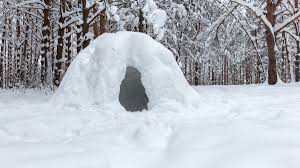
Building a Snow Shelter in the Wilderness
Materials Needed:
- Snow (preferably compact, like the kind you can make snowballs with)
- A shovel or a sturdy object to carve the snow
- A knife or saw (optional for finer work)
Steps:
1. Find the Right Location:
- Look for a spot that is sheltered from the wind, ideally against a tree or rock face.
- Avoid avalanche-prone areas and look for flat ground.
2. Gather Snow:
- Use your hands or a shovel to collect snow. The snow should be packed, not loose.
3. Start Digging:
- Dig a trench about 3 feet high and 4-5 feet wide. This will form the entrance and the base of your shelter.
- Ensure that the tunnel slopes downward; this helps with airflow and retains warmth.
4. Create the Sleeping Area:
- At the end of the trench, create a larger space by digging deeper into the snow. This is where you’ll lie down.
- Aim for at least 7 feet long and 3 feet wide.
5. Shape the Roof:
- Pack snow on the ceiling to create a dome shape; this design helps with structural integrity.
- Leave an entryway at the top of the cave for ventilation. A small hole will allow for fresh air and prevent carbon dioxide buildup.
6. Insulate:
- If time permits, create a layer of insulation inside the shelter using branches, leaves, or extra clothing to keep warm.
7. Add an Entrance:
- A short tunnel can serve as your entrance. This provides better insulation against the cold and minimizes heat loss.
8. Ventilation:
- Make sure there’s adequate ventilation. Openings at the top allow toxic gases to escape while still keeping warmth trapped inside.
9. Additional Considerations:
- Always have a backup plan and ensure someone knows your location in case of emergencies.
- Use sleeping bags or extra layers of clothing to stay warm.
Important Tips:
- Practice building a snow shelter before you need it; experience will make you faster and more efficient.
- Keep your gear dry and change out of wet clothes as soon as possible to retain body heat.
